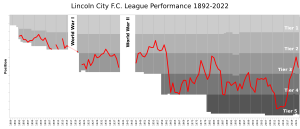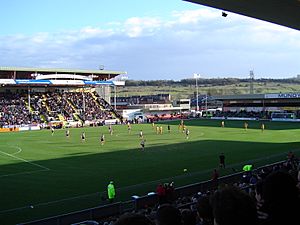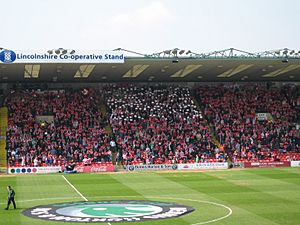History of Lincoln City F.C. facts for kids
Lincoln City Football Club, often called 'The Imps', was started in 1884. They quickly became a strong team, winning the Midland League in 1889–90. Soon after, in 1892, they helped create the Football League Second Division. Over the years, Lincoln City has moved between different leagues, showing great spirit.
They've had many ups and downs, including winning the Third Division North title multiple times. A big moment was in 1975–76 when they won the Fourth Division title under manager Graham Taylor, setting new records! After some tough times, they even dropped out of the Football League in 1987, but bounced right back the next year.
The club reached the play-offs five times in a row from 2002 to 2007, showing how determined they were. In 2011, they were relegated again, but the Cowley brothers, Nicky and Danny, led them to an amazing comeback. In 2016–17, they won the National League title and made history by reaching the FA Cup quarter-finals as a non-league team – the first in 103 years! They also won the EFL Trophy in 2018 and became League Two champions in 2018–19, returning to the third tier after 20 years.
Contents
How Lincoln City Started
Football was popular in Lincoln even before the club began in the 1860s. Lincoln City FC was formed in 1884 as an amateur team. They became a professional club in the 1891–92 season.
Early Home Grounds
The team first played at a ground called John O'Gaunts. This ground was provided by a rich local brewer, Robert Dawber. In 1895, they moved to their current home, Sincil Bank.
First Games and Wins
Lincoln's first game as an amateur team was a huge 9–1 win against Sleaford on October 4, 1884. George Hallam scored the club's first-ever goal and also the first hat-trick that day! Their first home game was also a big win, beating Boston Excelsior 11–0. Edwin Teesdale scored four goals in that match.
Before joining the Football League, the County Cup was very important. Lincoln won it for the first time in 1886–87. They beat their rivals, Grimsby Town, 2–0 in a replay after the first game was a 2–2 draw.
Joining the Football League
Lincoln helped create the Second Division in the 1892–93 season. More and more clubs wanted to join the Football League back then. Lincoln's first game in the Football League was a 4–2 loss away to Sheffield United on September 3, 1892. Their first home game was also against Sheffield United, but this time Lincoln won 1–0.
The first game at Sincil Bank in 1895 was a friendly 0–0 draw with Gainsborough Trinity. This move happened after Robert Dawber passed away. The first competitive match at Sincil Bank was against Arsenal, and it ended in a 1–1 draw.
FA Cup Success
In January 1907, Lincoln surprised everyone by knocking Chelsea out of the FA Cup. Manager David Calderhead saw his team score two late goals to get a draw in the first game. In the replay in London, Norrie Fairgray scored a goal in injury time, sending Lincoln through! After this, Chelsea hired Calderhead to be their manager.
Between the World Wars
Before the 1920s, Lincoln often moved between the Second Division and local leagues. In the 1921–22 season, Lincoln and other clubs helped create the Third Division (North). Lincoln was promoted to the Second Division in 1931–32. However, they were relegated back to the Third Division (North) just one season later.
After World War II
Lincoln was promoted to the Second Division in 1947–48. But they were relegated back to the Third Division the very next season. They earned promotion again in 1951–52 and stayed in the second division for eight years. Then, they faced two relegations in a row in 1960–61 and 1961–62, ending up in the Fourth Division.
The Graham Taylor Era (1975–1985)
The 1975–76 season was a special one for Lincoln City. Under future England manager Graham Taylor, the club won the Division 4 title. They set a record for the most points (74) under the old 2-point system for a win. They also won the most games (32) and lost the fewest (4).
Lincoln City also scored over 100 league goals (111 in total) that season, which was rare. They won 21 out of 23 home league games and 11 away games. Graham Taylor later said that "teams were scared of coming to Sincil Bank" during that time.
Tragedy at Bradford City
In 1982 and 1983, Lincoln almost got promoted to the Second Division. In 1985, Lincoln was playing against Bradford City when a terrible fire happened at the stadium. Fifty-six people died, including two Lincoln fans, Bill Stacey and Jim West. The club later named the Stacey-West stand after them to remember them.
Challenges and Comebacks (1986–2000)
Lincoln was relegated again the next season. The year after that, they became the first team to be automatically relegated from the Football League. This was a big drop for a club that had almost reached the Second Division just four years earlier. This was the fourth time Lincoln had left the Football League, a record.
However, they quickly returned! They won the Conference title in their first try. This meant they were promoted back to the Football League. On September 8, 1990, during a game against York City, a sad event occurred. York City player David Longhurst suffered a fatal heart attack. The game was stopped at halftime.
Into the New Millennium
At the end of the 2001–02 season, Lincoln City faced financial problems. Manager Alan Buckley left, and Keith Alexander took charge. Lincoln managed to deal with their money issues.
Play-off Runs
In 2002–03, many people thought Lincoln would be relegated again due to their financial troubles. But Keith Alexander, with a team of new, affordable players, led them to the play-off final! They lost 5–2 to Bournemouth. Even though they didn't win, the team was celebrated with a parade in Lincoln. This showed how much their achievement meant to the city.
In 2003–04, Alexander again surprised everyone by guiding the Imps to another play-off spot. They lost to Huddersfield Town in the semi-finals. Alexander, one of the few black managers in the Football League, had a serious brain injury during the season but made a full recovery. In 2004–05, they reached the play-offs for the third year in a row. They beat Macclesfield Town in the semi-finals but lost 2–0 to Southend United in the final after extra time.
In 2005–06, Lincoln City played against Premier League side Fulham in the League Cup. They took the game to extra time before losing 5–4. In the league, Lincoln again reached the play-offs, even after many thought they wouldn't. They faced local rivals Grimsby Town in the play-offs, a team they had beaten 5–0 earlier in the season. But Lincoln lost 3–1 overall, becoming the first team to lose four play-off competitions in a row.
Keith Alexander left the club in May 2006, saying he couldn't take the club any further. John Schofield became the new manager. For the fifth year in a row, Lincoln City reached the League Two play-offs. But they lost again, this time to Bristol Rovers in the semi-finals. Losing five play-off competitions in a row is a record for any club.
Managerial Changes and Relegation
The team started the 2007–08 season poorly. Managers John Schofield and John Deehan were replaced by Peter Jackson. Jackson quickly became known as "Lord of the Imps" because his name was similar to the director of the Lord of the Rings films. Jackson left the club in September 2009.
On September 28, 2009, former Chelsea and England striker Chris Sutton became the new manager. He led Lincoln City to the third round of the FA Cup, where they played against Premier League side Bolton Wanderers. Lincoln lost 4–0 but played well against the top team.
Sutton resigned in September 2010 due to disagreements about spending. Steve Tilson was hired as the new manager. Things looked better for a while, but then Lincoln started to lose many games. After nine losses and one draw in their last ten games, Lincoln City was relegated from League Two on the final day of the 2010–2011 season. They needed a win but lost 3–0 to Aldershot Town. Almost 8,000 fans watched the game.
Time in the Conference League
After being relegated to the Conference Premier, Tilson let go of almost all the players. By October 2011, Lincoln was close to the relegation zone, and Tilson was sacked. Grant Brown took temporary charge.
David Holdsworth became the new manager. He kept the Imps safe from relegation, but they also had early exits from the FA Trophy and FA Cup. In February 2013, Holdsworth left the club. Gary Simpson, a former assistant manager, took over. Safety was secured on the final day with a 5–1 win against Hyde.
After a good start to the 2013–14 season, Lincoln had a tough period. They finished 14th, their best position since relegation. Gary Simpson left in November 2014, and Chris Moyses became the new manager. Lincoln finished 15th that season and 13th in 2015–16. Moyses then left to focus on his business, and Danny Cowley became the new manager.
The Cowley Brothers' Success
City started the 2016–17 season with mixed results. But then they went on a winning streak, reaching the top of the table for the first time in ten years! They even came back from being 2–0 down to win 3–2 against Forest Green Rovers.
This great form continued into the new year. Danny Cowley led the Imps to win the National League title! This meant they returned to League Two for the first time in six years.
In the 2016–17 FA Cup, Lincoln had an amazing run. They beat Championship teams Ipswich Town and Brighton and Hove Albion. Then, on February 18, they made history by beating Premier League side Burnley 1–0! This made them the first non-league club to reach the FA Cup quarter-finals since 1914. In the quarter-finals, they were defeated 5–0 by Arsenal.
Back in the Football League
In the 2017–18 season, Lincoln City made history again. On February 6, 2018, they beat Chelsea U21s in the semi-final of the EFL Trophy. This meant they would play at Wembley Stadium for the first time in the club's 134-year history! They went on to win the final against Shrewsbury Town on April 8, 2018. Elliot Whitehouse scored the only goal, winning the trophy for Lincoln.
In the League Two play-offs, Lincoln drew 0–0 with Exeter City in the first game but lost 3–1 in the second.
League Two Champions
In the 2018–19 season, Lincoln City announced that Nettleham Ladies FC would become Lincoln City Women. On April 22, 2019, Lincoln won League Two after a 0–0 draw against Tranmere Rovers. They had been at the top of the table since August 25, 2018! This promotion meant Lincoln would play in EFL League One for the first time since 1998–99.
Lincoln started their first season in the third tier well, winning their first three games. However, on September 9, 2019, manager Danny Cowley left to join Huddersfield Town. He had guided Lincoln to two promotions in three seasons with his brother and assistant manager, Nicky.
In the 2022–23 EFL Cup, Lincoln reached the fourth round, matching a club record. They lost 2–1 to Southampton. After leading Lincoln to a good finish in the 2022–23 season, manager Mark Kennedy left the club when the Imps were in 16th place.
|
 | Delilah Pierce |
 | Gordon Parks |
 | Augusta Savage |
 | Charles Ethan Porter |




